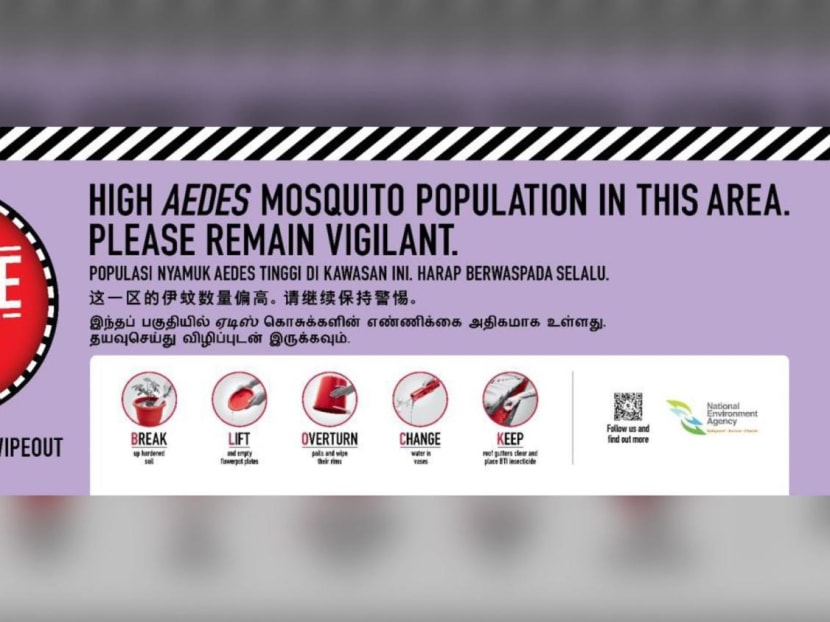Dengue cases rising sharply in Singapore, 'urgent collective community effort' needed to fight surge: NEA

New purple banners will be displayed in areas with a persistently high Aedes aegypti mosquito population. (Image: National Environment Agency)
SINGAPORE: Dengue cases are rising sharply in Singapore, with 264 cases reported in the week ending Mar 5, the National Environment Agency (NEA) said on Thursday (Mar 10).
This is an increase of 65 cases compared to the week before - a spike of more than 32 per cent.
The number of dengue cases in Singapore has been on the rise for eight weeks, with a total of more than 1,500 cases reported so far this year.
| Period | Number of reported dengue cases |
| Jan 23 - 29 | 171 |
| Jan 30 - Feb 5 | 154 |
| Feb 6 - 12 | 169 |
| Feb 13 - 19 | 206 |
| Feb 20 - 26 | 199 |
| Feb 27 - Mar 5 | 264 |
| Mar 6 - 9 (at 3pm) | 206 |
Source: NEA
“A contributing factor and key concern is the high Aedes aegypti mosquito population detected in the community, which has increased by about 9 per cent in January 2022 compared to in the same period last year,” NEA said in a media release.
“If left unchecked, the current high Aedes aegypti mosquito population – together with circulation of the previously uncommon dengue virus serotype 3 (DENV-3) and sizeable proportion of people still staying in and working from home – may lead to a surge in dengue cases in the coming months.
“NEA therefore urges members of the public and other stakeholders to stay vigilant and not let their guard down, as dengue remains a serious public health threat.”
NEA said that an “urgent collective community effort is needed to drastically reduce mosquito breeding habitats” and fight the surge in cases.
The agency urged residents and operators of premises to check its website regularly and to use the myENV app so that they can be notified about areas with higher populations of Aedes aegypti mosquitos.
“Residents living at these areas … are advised to be vigilant and take preventive measures against mosquito breeding, including doing the Mozzie Wipeout at least once a week to remove stagnant water,” NEA said.
NEW ALERT BANNERS
The agency will also be deploying new alert banners in areas with persistently high Aedes aegypti mosquito populations in the coming weeks. It said that these areas can be, on average, three to 10 times more likely to see large dengue clusters compared to areas with lower mosquito populations.
“These areas form a subset of locations with higher Aedes aegypti mosquito population, which NEA currently updates monthly on its website,” NEA said.
“The intent is to alert residents, community partners and key stakeholders at such areas to take preventive measures against mosquito breeding, in order to reduce the risk of dengue.
“The new purple-coloured banner will be added to NEA’s existing Dengue Community Alert System, which now includes the display of colour-coded banners to inform residents and members of the public about the dengue situation at their estates.”
NEA deputy CEO Chew Ming Fai said that the agency is taking a pre-emptive approach to tackling dengue.
“Our dengue prevention efforts are not only focused on dengue cluster areas, but include non-dengue cluster areas that have higher Aedes aegypti mosquito populations,” he said.
“Taking a pre-emptive approach in heightening dengue awareness and mobilisation of the community for dengue prevention efforts is key to our vector control strategy,” he added.
As of Thursday afternoon, the NEA website showed 12 areas classified under the "red" alert level for dengue. These are deemed to be high-risk areas where clusters of 10 or more dengue cases have been formed.
The two biggest active clusters are located in Bukit Timah, with one off Dunearn Road and the other off Jalan Jurong Kecil.
Red clusters have also been reported in Woodlands, Clementi and Kaki Bukit.





